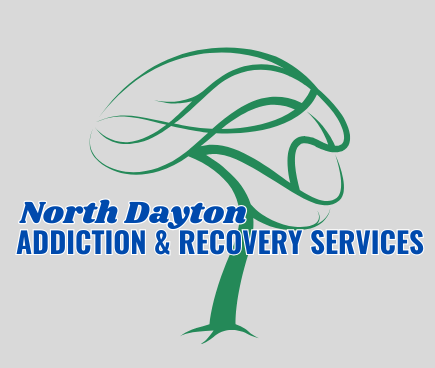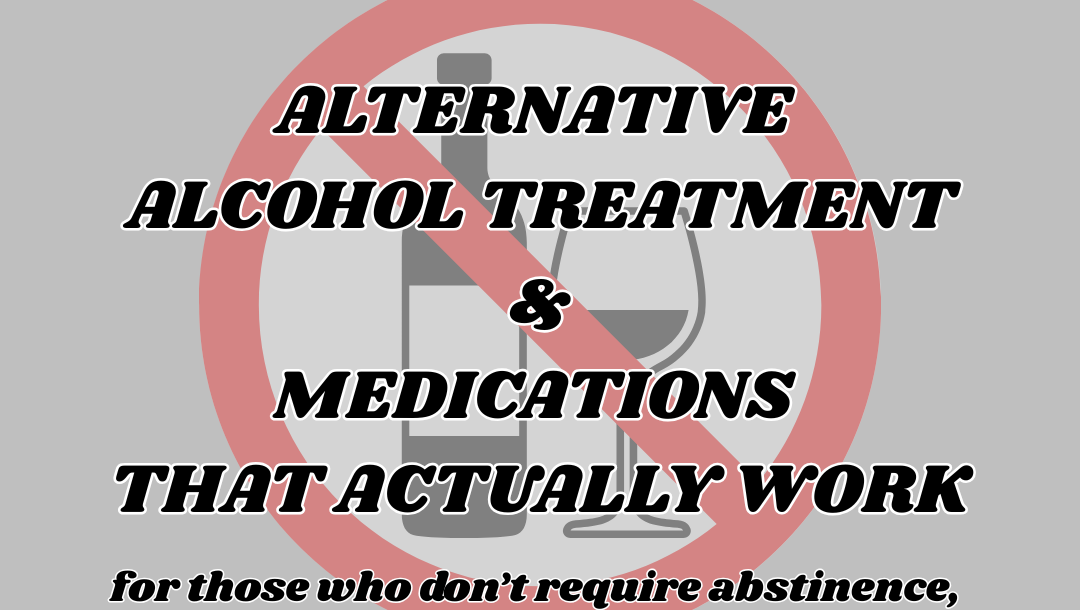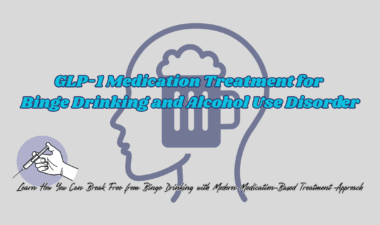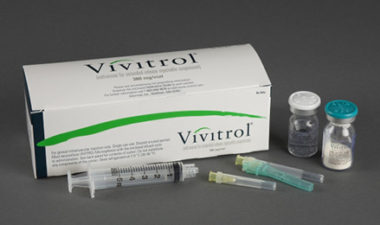
Do you feel like you have an unhealthy relationship with alcohol, but complete abstinence from alcohol isn’t something you’re ready to take on? If when you drink, you almost always drink a little too much, or if consuming alcohol has become a habit, simply just part of your life that you feel unable to control? Most people who drink too much (but aren’t the “textbook alcoholic”) believe that the only recovery option is to just stop altogether, which is something they typically aren’t willing to do. However, abstinence is not the only option to manage alcohol dependence. While there are many people who best benefit from complete abstinence, there is a large group of people who would benefit from simply drinking less and effectively limiting their total consumption. Treatment using medications to naturally eliminate cravings for alcohol is a scientifically proven and highly successful method to reduce alcohol use without abstinence. This effect, known as “pharmacological extinction”, gradually returns the brain to its pre-addiction state by greatly reducing the euphoria and reinforcement alcohol provides.
Comfortable & Discreet Outpatient Medication- Assisted Treatment For Excessive Drinking
Effective treatment for the entire alcohol use disorder spectrum (mild, moderate, or severe) starts with the identification of the reasons an individual may be drinking too much. This allows the determination of the patient’s unique set of needs, and the development of a personalized approach to treatment and a personalized management plan. Consequently, the appropriate medication can be selected and goals for alcohol use reduction and/or elimination set. The extended treatment plan includes individual tracking of patient progress, monitoring of medication effectiveness, and routine physician follow ups. Success in most cases is defined as a significant reduction in consumption and drinking days, achieving an identifiable goal of a targeted number of drinks per week, and being in control of when you’re able to stop, or the ability to choose to not begin drinking at all.
At NDARS, our practice is dedicated to providing an array of services and programs to assist all different kinds of alcohol recovery goals, at your own pace and on your own terms. Some may want to drink less alcohol, but do not necessarily want to stop drinking altogether, while others want to completely become abstinent altogether. We believe that improving your life by reducing or eliminating your alcohol use is a personal experience, and our individualized treatment approaches are carefully tailored to each patient’s needs.
The Sinclair Method (TSM)
The Sinclair Method (TSM) is a clinically studied, proven effective treatment for alcohol addiction that uses a technique called pharmacological extinction to retrain your brain to not enjoy alcohol by blocking the euphoria that alcohol provides while you are actively drinking by taking a medication prior to drinking. Over time, this effect gradually reduces your alcohol consumption, stops the urge to continue drinking once started, and results in increased alcohol free days. Abstinence is not required while following TSM. With 100% compliance to program protocols, 80% of people can expect to successfully control their drinking and get to a point where alcohol simply doesn’t cross your mind.
GLP-1 Medications
Glucagon-like peptide-1 (GLP-1) receptor agonists, originally developed for the treatment of type 2 diabetes and later widely adopted for weight loss, have recently garnered significant interest for their potential role in addressing alcohol use disorder (AUD). Medications in this class, such as semaglutide (Ozempic, Wegovy) mimic the effects of the endogenous hormone GLP-1, which is involved in glucose regulation, gastric emptying, and appetite suppression. Emerging research suggests that beyond their metabolic effects, GLP-1 receptor agonists may exert influence on the brain’s reward circuitry—specifically on the dopaminergic system that plays a central role in addiction. These brain neurotransmitters are heavily implicated in the reinforcing properties of addictive substances, including alcohol. Human trials are in early stages but are promising, with small clinical studies and anecdotal reports indicating decreased alcohol craving and intake in patients prescribed GLP-1 medications for other indications. One proposed mechanism is that GLP-1 receptor activation diminishes the rewarding properties of alcohol, making consumption less pleasurable or compulsive. The potential for GLP-1 medications to provide dual benefits—weight loss and reduced alcohol intake—is appealing to both clinicians and patients.
The current interest in GLP-1 medications as a potential tool for managing alcohol use disorder reflects a critical and timely intersection of metabolic science and addiction medicine, promising a new direction in the treatment landscape.
For patients who are overweight or diabetic and drink excessively, GLP-1 medications may be an appropriate clinical option for management of multiple health treating disorders.
Vivitrol Injections
Vivitrol is a non-addictive, once-monthly injection (extended release naltrexone) proven to help reduce heavy drinking days in alcohol-dependent patients. Patients who are on Vivitrol report they “just have no desire to drink.” Vivitrol, along with chemical dependency counseling, helps stop the addictive behaviors while reinforcing recovery for one month at a time while you work on the psychological aspects of addiction through counseling, support meetings and self help.
Psychiatry & Mental Health
Because dependence and addiction often stem from untreated mental health disorders, ensuring a proper diagnosis and treatment of certain mental health conditions is important for long term recovery. If you have certain conditions, such as depression, anxiety, or PTSD that cause you to want to drink, or exacerbate your drinking, it is important to identify and treat from the beginning for the best possible outcomes.
AOD Assessments
Have you gotten into trouble with the law, and need a drug and alcohol assessment to help you understand what kind of treatment you need? AOD assessments are a common part of the judicial system and often the first requirement once you’ve gotten into some kind of trouble. We are able to provide AOD assessments and treatment planning to those who have these documents mandated, or if you simply feel like you’d like to hear from a professional what type of treatment is expected for best possible outcomes.
Chemical Dependency Counseling
Chemical dependency counseling is a unique type of therapy. It addresses the ways in which drugs and alcohol affect people on personal and physical levels and in their relationships with others. In a MAT program for alcohol dependence, therapy can be just as important as the medication itself; the medication will help take cravings away while allowing you the opportunity to heal from the past. You’ll also learn positive coping mechanisms to avoid relapse in the future. We have a chemical dependency counselor on staff who is available for consultation during your appointments. You can also set up additional sessions with the counselor if you choose.
Support Meetings
Support meetings are all about self-help and building a strong sober support community. They introduce you to principles that will help you to prioritize your recovery every day, all on your own. Twelve-step meetings are a great complement to any and all MAT programs, however group meetings are not recommended for all. Support meetings can give you a place to talk through what’s on your mind to people who have been there and can help you make new friends and meet new people who are also living the same, new lifestyle as you.
Recovery, right here.
North Dayton Addiction and Recovery Services offers many options to help individuals recover from alcohol use disorder. Our program is private, comfortable and confidential, and we offer outpatient treatment with telemedicine services available. We treat patients throughout the states of Ohio, Indiana, Florida and Arizona.If you feel as though you would benefit from reducing your alcohol consumption, or want to become abstinent from alcohol, give us a call to learn about our treatment options and what is right for you. Please check out our blog section for more specific dialogue on our non-traditional treatment approaches that offer an alternative to inpatient detox, complete abstinence & AA.




